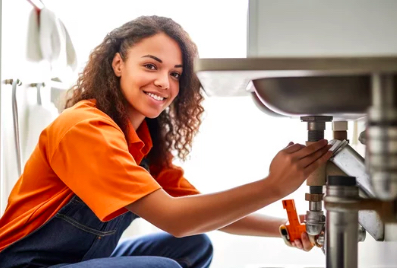Plumbers are skilled tradespeople who install and repair the systems that provide water, hot-water production, sewage, and drainage in residential and commercial buildings. Parma Plumber also works with gas lines.
This career requires strong analytical problem-solving skills to identify and resolve issues. It also involves collaborating with other professionals, such as architects and construction teams, to ensure that plumbing systems are integrated seamlessly into building projects.
Plumbing is the system of pipes, fixtures, and appliances that supply water and remove waste. Plumbers install, repair and maintain these systems in residential, commercial and industrial buildings. Their responsibilities also include inspecting and testing plumbing systems to meet health and safety standards. Plumbers are highly skilled professionals with an in-depth knowledge of water and drainage systems. They use a wide range of tools and equipment to perform their job. They also must be able to read blueprints and understand construction and building codes.
The demand for plumbers is high due to the complex nature of their work. They are required to inspect, repair and maintain intricate plumbing systems in homes, office buildings, retail stores, restaurants and hospitals. Plumbers must be able to handle heavy machinery and work in cramped spaces. They also need to be comfortable working around hazardous materials like chemicals and sewage.
Besides installing new taps, toilets and showers, plumbers can also relocate existing ones. They can also install gas and water heaters. In addition to this, they can inspect the whole plumbing system of a home and recommend any necessary repairs. They can also offer preventive maintenance services such as cleaning drains and septic tanks.
Apart from the aforementioned duties, plumbers also provide emergency services. They can fix burst pipes, clogged drains and other plumbing issues that may require immediate attention. These plumbers are highly dependable and can be called at any time of the day or night.
The local council and state governments regulate the plumbing industry. In order to become a licensed plumber, one must complete a vocational training program that includes both classroom studies and on-the-job learning under the supervision of an experienced journeyperson. In addition to this, they must pass a background check and drug test. Many people choose to become plumbers as a career because of the variety of tasks involved and the ability to earn good money. However, this is not a suitable occupation for everyone. It is important to consider your options carefully and weigh the pros and cons before making a decision.
Plumbing is a skilled trade that requires knowledge of a wide range of tools and equipment. It also requires critical thinking skills to weigh up possible solutions and make the best choice for a given situation. Plumbers must also have good customer service skills as they will often be dealing with stressed customers who are facing a plumbing emergency.
Plumbers can offer various maintenance services to keep homes and businesses running smoothly. These might include inspecting existing pipe work to detect leaks or other problems; unclogging drains; fitting replacement parts such as taps and toilets; connecting waste disposal units; installing shower screens and baths; power flushing heating systems; replacing broken sealants around sinks and basins; and advising on water conservation and efficiency.
One of the most common duties of a plumber is to install plumbing systems in new construction projects. This involves laying pipes, setting toilets and bathtubs, and hooking up appliances like dishwashers and washing machines. It is important for plumbers to follow blueprints and building codes when doing this type of work. It is also essential for plumbers to have excellent attention to detail, as mistakes can be costly and dangerous.
While installation is a key aspect of a plumber’s job, maintaining and repairing plumbing systems is just as important. Plumbers need to have strong problem-solving skills to identify and fix issues with clogged drains, leaking faucets, and water heaters. They must also be able to work well under pressure as they will often be working in tight spaces and restricted positions.
For plumbers who want to take their career to the next level, gaining certification is a great option. This will enable them to work in more specialised areas of the industry, and it will also give them more independence and flexibility with their work. Plumbers can choose to become certified through an apprenticeship, which will combine classroom learning with paid on-the-job training. The duration of an apprenticeship varies, but it typically lasts for four to five years. After completing the program, plumbers will be required to pass a trade test.
As plumbing systems age, they can start to develop problems. Whether it’s a dripping faucet or clogged toilet, these issues can become serious if not addressed quickly. Rather than trying to fix them yourself, you should contact a plumber for professional repairs. These professionals can handle any kind of problem, from leaking pipes to water heater installation.
Before you hire a plumber, ask about their experience and qualifications. It’s also a good idea to find out what their hourly rate is. This will help you budget for the service. It’s also important to ask about any additional costs, such as materials or equipment rentals.
Residential plumbers repair and install a wide variety of plumbing fixtures, including sinks, bathtubs, showers, and toilets. They also work on hot-water systems and drainage pipes. Some plumbers specialize in specific types of fixtures, such as tankless water heaters or commercial plumbing.
Commercial plumbing plumbers work on larger scale plumbing systems in businesses, hospitals, and apartment complexes. They often focus on installing and repairing water tanks, heating and cooling systems, and drainpipes. They may also work on plumbing systems that supply drinking water, such as filtration systems.
Leaking pipes are one of the most common plumbing problems. They can cause significant damage to your home and lead to expensive repairs if not fixed quickly. You can detect a leaky pipe by listening for running water or looking for dark stains around your pipes.
Another common issue is a clogged or overflowing toilet. While these problems can be difficult to deal with, they are usually easy for a plumber to diagnose and fix. To prevent clogs and overflows, you should use a quality toilet brush and a plunger on a regular basis.
Sewer lines are often overlooked until they stop working altogether. A plumber can repair or replace these lines to prevent water and sewage from backing up into your home. These professionals can also diagnose and treat other plumbing issues, such as low water pressure, clogged toilets, and broken faucets. When choosing a plumber, make sure to consider their experience and customer reviews. You can also ask for a list of references from previous clients.
Plumbing systems are complex and rely on a variety of components to function properly. They provide water, waste disposal, and regulate indoor climate through pipes, valves, fixtures, and more. If one of these parts fails, it can cause serious problems for the entire home. Plumbers can troubleshoot and repair these systems to restore functionality. This job requires a combination of technical knowledge, practical skills, and problem-solving abilities.
Plumbers also install and repair plumbing fixtures. These include taps, toilets, sinks, and showers. Some examples of fixture problems include a dripping faucet, clogged drain, or low water pressure. In some cases, these fixtures may need to be replaced entirely. Plumbers can also install water heaters and other appliances that use water.
Some plumbers specialize in residential plumbing, while others work on commercial or industrial systems. Commercial and industrial plumbing jobs are typically larger in scale and more complex than residential ones. These jobs require specialized tools and equipment, as well as knowledge of industrial processes and regulations.
In addition to installing and repairing fixtures, plumbers can also help with water quality issues. For example, they might test a water sample for contaminants or recommend ways to improve water flow and pressure. They can also fix filtration issues, such as when a filter stops working or needs to be replaced.
One of the most important services that plumbers offer is emergency repairs. They respond to service calls from homes and businesses for plumbing emergencies like leaky faucets, clogged drains, or broken toilets. They use their knowledge of the plumbing system to diagnose the problem and determine the best solution. This can involve examining the interior of pipes to find the source of the issue or using specialized tools to clear blocked drains.
Plumbing is a hands-on job that involves physical labor and oftentimes working in tight spaces. It requires attention to detail, as even a small mistake can lead to major consequences. Plumbers must be comfortable with handling heavy tools and spending long periods of time on their feet. They must also have good customer service and communication skills to interact with clients.
